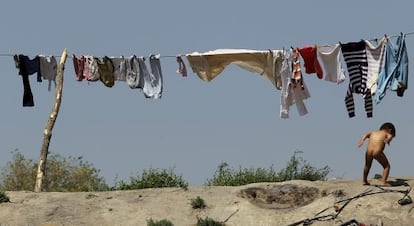298 children living like poorest in Nigeria on Madrid outskirts ¡ª report
Youngsters in El Gallinero shantytown live among trash and violence only 12km from center

¡°I don¡¯t like to be a thief or to be this dirty. I want clean work and to bring my money home,¡± says one of the 298 children who live in the shantytown known as El Gallinero, on the outskirts of Madrid.
The youngsters there spend their childhoods among trash, excrements, rats, snakes and the threat of extreme violence.
A new report by Save the Children and the Catholic-run Comillas Pontifical University equates the conditions in El Gallinero, which is situated only 12 kilometers from downtown Madrid in the Villa de Vallecas area, to those found in countries like Nigeria and Ethiopia.
Ana Sastre, the non-profit group¡¯s director of childhood policies, says the children there ¡°live on the fringes of Spanish society, in conditions similar to those found in the worst shantytowns in the world. They have limited access to water and are in permanent danger on a daily basis.¡±
The children live on the fringes of society, in conditions similar to those in the worst shantytowns in the world¡± Save the Children¡¯ s Ana Sastre
The report is based on 40 interviews with children at El Gallinero, where 298 of its 435 residents, who are mostly ethnic Roma from Romania, are under 18, according to the religious workers who deliver food there twice a month.
¡°They are completely isolated, 35 minutes away from all public services,¡± says Fernando Vidal, head of the Family Institute at Comillas University.
Because there is just a single source of water in the entire settlement, the children are forced to carry heavy containers to and from their homes. Surrounded by waste, wild animals and a road along which drug users drive at breakneck speeds, the youngsters there have a 98 percent probability of dying before the age of 60, compared with the Spanish average of seven percent.
Violence is also a constant presence in their lives, either through adult alcoholism or the regular evictions carried out by authorities ¨C 82 in the last two years.
¡°They feel invaded, and they cannot tell the difference between safe and dangerous, or between clean and dirty,¡± says Carlos Pitillas, a psychology instructor who has analyzed dozens of drawings made by children depicting their own surroundings.
One boy¡¯s drawing, made with an orange pencil, shows adults attacking each other with sticks and knives.
¡°We will not allow a lawless town¡±
The coordinator of Madrid's social services department, Carlos Mart¨ªnez Serrano, was there for the presentation of the report. "The real problem with El Gallinero is that some people want to keep it that way," he said. "They are the ones who exploit their own children."
"Some groups have suggested that we should give them some municipal land, but we cannot do that without a public bid, and it would set a precedent for other settlements. We cannot allow the creation of a ghetto or a lawless town."
¡°They are in a permanent state of fear and defenselessness, and they don¡¯t know how to react to it,¡± adds Pitillas.
One of the few areas available for them to play is a soccer field that is full of mud in the winter; the only other option is a road that crosses the shantytown. One boy explained that cars drive along it very fast, and that he is scared they will hit his brother or his cousin.
¡°A little girl, two years old, was walking there and she got hit,¡± says another girl. ¡°She has a broken foot and a huge wound.¡± Nearby are areas with huge tangles of electrical cables, where are man was electrocuted.
The good news, says the report, is that schooling levels are high, mostly thanks to volunteers who help out in a nearby building. But the children themselves have a pessimistic view of the future.
¡°Crime is a very big problem,¡± says one boy. ¡°Instead of going to school to learn, they will continue to steal and live in El Gallinero forever.¡±
He is not the only one who feels that way. ¡°They are going to suffer from social exclusion as a generational curse. What we do today will condition their adult lives,¡± says Sastre.
The picture is clear, but neither the city nor civil associations have yet found the right solution. Because the children have strong family ties, taking custody away from the parents is ruled out.
¡°The overarching interest for the minor is to not be taken out of his or her surroundings. That would only make things worse,¡± says Sastre.
Tu suscripci¨®n se est¨¢ usando en otro dispositivo
?Quieres a?adir otro usuario a tu suscripci¨®n?
Si contin¨²as leyendo en este dispositivo, no se podr¨¢ leer en el otro.
FlechaTu suscripci¨®n se est¨¢ usando en otro dispositivo y solo puedes acceder a EL PA?S desde un dispositivo a la vez.
Si quieres compartir tu cuenta, cambia tu suscripci¨®n a la modalidad Premium, as¨ª podr¨¢s a?adir otro usuario. Cada uno acceder¨¢ con su propia cuenta de email, lo que os permitir¨¢ personalizar vuestra experiencia en EL PA?S.
?Tienes una suscripci¨®n de empresa? Accede aqu¨ª para contratar m¨¢s cuentas.
En el caso de no saber qui¨¦n est¨¢ usando tu cuenta, te recomendamos cambiar tu contrase?a aqu¨ª.
Si decides continuar compartiendo tu cuenta, este mensaje se mostrar¨¢ en tu dispositivo y en el de la otra persona que est¨¢ usando tu cuenta de forma indefinida, afectando a tu experiencia de lectura. Puedes consultar aqu¨ª los t¨¦rminos y condiciones de la suscripci¨®n digital.








































